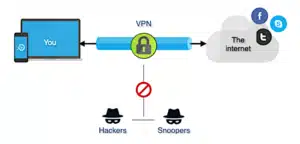Proxy vs VPN: Understanding the Key Differences

Introduction: Proxy vs VPN
Consequently, privacy and especially security of personal information in the digital world is a crucial topic. Some of the ways which people employ to cover their activities are through use of proxies and Virtual Private Networks (VPNs). As with most things, both have similar uses but are dissimilar in ways.
Let’s first understand what proxies and VPNs are, different types of them and how do they stand in front of each other when it comes to security, speed and approximate usage. After explaining these technologies, you can decide, which one is more suitable for you.
What is a Proxy?
A proxy server is a server that acts as an agent, or middleman for your device and the internet. It is a mediator which translates requests from your device to the Internet and vice versa, providing the data.
If you are using some proxy your actual IP address is substituted to the IP address of the proxy server thus giving you a certain degree of anonymity. However, proxies as a rule do not encrypt traffic, which implies that your information may well be intercepted. Proxies are good when it comes to unblocking geo-restriced websites and obscuring your real IP to an extent of privacy.
Types of Proxies: HTTP, SOCKS, and More
Proxy servers are of many kinds, and they have distinct functions. HTTP proxies only deal with Web traffic and are frequently utilised for web surfing. Some of them can work as web cache to enhance the rate of browsing internet. For instance, SOCKS proxies are more flexible, support all types of connections, including FTP connections, and peer-to-peer connections.
Others are transparent proxies that are employ mainly for content filtering while the reverse proxies hide identity of the web servers. The one that you select for your network largely depends on the type of traffic you want to transfer.
What is a VPN?
VPN is a service that connects your device and the internet through creating a secure encrypted connection. When you engage in VPN, then all your internet connection is actually passing through a secure server. This makes sure your IP address must be hidden and all your data encrypted and safe from hackers. VPN is intended to maintain anonymity, evade such restrictions as censorship, and protect the connection in Public Wireless Networks. While with proxies all traffic going through their services is unprotected, VPNs ensure that all your information is encrypted.
How VPNs Ensure Online Privacy and Security
VPNs provide effective security features through the encryption of its Internet traffic thusing hackers, ISPs and government from monitoring users’ activities online. Thus it can be concluded that, the majorities of the VPN’s have highest form of encryption protocol like AES-256.
This way even if somebody tries to intercept your traffic, it would be almost impossible to decrypt it. Also, by hiding the user’s IP address VPN protects the person from being tracked by the site they are visiting or other third parties. VPNs are perfect for anyone who wants to protect certain data or simply does not want to leave a digital footprint behind.
The distinction between the concepts and their workings Then and Now Proxy vs VPN
Despite both having the major functions of anonymity and unblocking of some sites both proxies and VPN cannot be used interchangeably. It primarily concerns the protection issue and with encryption where VPN provides strong encryption for all traffic while proxies do not.
More security and privacy is offered by VPNs because all transmitted data is encrypted. On the other hand, proxies only forward selected kinds of connections, while other actions remain uncovered. Also, VPN’s provide more privacy against its users and is more reliable than a proxy service, which only enhance the privacy to some extent and increases speed slightly.
Speed and Performance: Proxy vs VPN
In regard to speed and performance, it can be seen that proxies usually outperform VPNs. Of cause proxies do not encrypt and thus offer much faster connection speeds especially when it comes to the simplest operations such as visiting some site or streaming. VPNs generally won’t decrease your internet speeds noticeably since encryption and secure tunneling are seemingly resource intensive.
But this is done at the cost of speed to make amends for the security and privacy it provides for users. Therefore, the best between the two depends on how you want to use it; if you want it for speed then use proxy servers while if you want the best privacy then use VPNs.
Security
In fact, in the area of security, VPNs are better than proxies. VPNs secure your whole internet connection which offers extreme security against assailants and spying authorities. This makes them suitable for confidential surf than on other Networks such as the public networks.
Proxies on the other hand only provide anonymity by hiding your IP but does not encrypt your data. Therefore, proxies less secure than VPNs and we advise against using them for tasks which require entry of some sensitive information like credit card numbers while shopping online or checking bank balances online. Quite simply, and in countries where this matters, if security is a consideration, then the VPN is the way to go.
Use Cases: When to Choose a Proxy and When to Use a VPN
A proxy and a VPN can, therefore, be compared in terms of the benefits but what you choose will depend on your particular needs. Most commonly, proxies are employed for such purposes as overcoming regional restrictions or web crawling, where anonymity is not such a large concern.
They are also necessary for users that require a quicker connectivity rate for shallow surfing. In a case of privacy, security or protection of data which is considered sensitive a VPN is the most appropriate option. VPNs also the best for banking and other critical transactions, watching hotspots, or if one lives in a country with a restrictive internet connection.
But which one should you choose for your needs?
Here is what you need to understand about a proxy and a VPN when choosing between them: If your concerns are limited to anonymity while surfing the web or mere evading geographic restrictions for occasional internet use then a proxy may suffice. But if you appreciate the need for an added layer of security, privacy, and data encryption then a VPN is more favorable.
VPNs are more protective and for anyone who wants privacy while using the internet, then VPN is the best for them. In the end, you need to make your best judgment depending on the protection that you want and the speed that you want to enjoy when browsing the internet.
Conclusion
Considering that both proxies and VPNs have their uses depending on the situation, they differ from one another. In terms of service, proxies are suitable for users requiring simple anonymity and relatively higher connection speeds while VPN offers user secure connection with the enhanced privacy using encrypted connections.
Considering concerns for privacy and security, as well as handling of personal data, a VPN will be the most suitable option. While comparing them and taking into account one’s individual needs, it is easy to decide what tool is appropriate for online operations.







